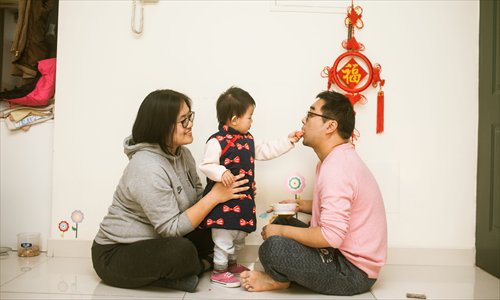

Many education experts have questioned whether the methods adopted by schools to instill filial piety are appropriate in contemporary society. Photo: Li Hao/GT
As part of a course in filial piety, a 15-year-old student surnamed Sun was asked to write down the names of his parents and close relatives during one of his high school classes in Heilongjiang Province.
"We were asked to cross out the names one by one. The crossed out name indicated the family member dying," said Sun. "Each time we removed a name, we were told to talk about the relative. The whole class would burst into tears."
The class, designed to evoke students' feelings of affection toward their parents and other elders in the family, was part of a series of workshops and lectures meant to cultivate filial piety among Chinese youth.
The concept of filial piety, or xiaodao, is a fundamental tenet of Confucian thought, and has been a cornerstone of Chinese society for thousands of years. But with the erosion of traditional values in the face of China's rapid modernization in recent decades, some schools like Sun's have taken the initiative to remind their students of the importance of filial piety.
Meanwhile, the introduction of filial piety activities in Chinese schools, and the methods adopted, have been controversial. Besides activities like those described by Sun, ceremonies in which hundreds of students are made to kowtow before their parents as a show of filial obedience have been widely reported in recent weeks.
Amid the fervor, some media commentators and education experts have questioned the value of filial piety in modern society. Others are challenging the sincerity of such displays, as well as the efficacy of such courses in fostering genuine filial devotion.
A controversial issue
The Global Times reported on January 11 that up to 750 students participated in a ceremony where students were made to kneel before their parents at Binxin School, a private school in Shanghai, during which parents and children were moved to tears.
Five days later, an article appeared on the People's Daily website, criticizing such ceremonies as insincere. "In many places, [these ceremonies] are becoming more and more formulaic, with kneeling down, kowtowing and crying as a par for the course," commentator Qin Chuan wrote. "They have become commercialized performances."
A recent poll carried out by the Beijing News showed that only 31 percent of more than 1,000 respondents supported such ceremonies unreservedly. An additional 44 percent said they endorsed the idea of filial piety activities in schools, as long as it was not only for show, while 25 percent objected to the ceremonies entirely.
Fu Jianqing, the principal of Binxin School, responded to criticisms in an interview with Shanghai-based news portal thepaper.cn. "The ritual is only one part of the school's Filial Piety Cultural Festival activities," said Fu. "[The point] is not the ritual itself, but whether the students have their minds opened by the ceremony."
Fu said that 97 percent of the school's students supported the idea of prostrating themselves before their parents. He said that the school was committed to continuing its education program in filial piety next year, but whether there will be a kowtowing ceremony would be up to parents and students.
The activities in filial piety adopted in some schools appear to be part of a concerted effort in recent years to revive filial piety in the national psyche, as a response to China's aging population.
In January 2011, 15 members of the Beijing Municipal People's Congress made a proposal to include lessons on filial piety in elementary and middle school textbooks, dividing public opinion. In 2013, an amendment to the Law on the Protection of the Rights and Interests of the Elderly caused much discussion, which states that a child who doesn't live with his or her parents should visit them often.
Copyright ©1999-2018
Chinanews.com. All rights reserved.
Reproduction in whole or in part without permission is prohibited.